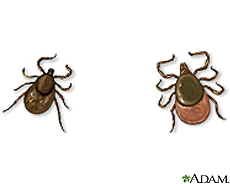 |
 |
 |
Other Health Topics:

-
Related Topics
-
Go Local
- Services and providers for Tick Bites in the U.S.
-
National Institutes of Health
- The primary NIH organization for research on Tick Bites is the National Institute of Allergy and Infectious Diseases
Tick Bites
If you spend time outdoors or have pets that go outdoors, you need to beware of ticks. Ticks are small bloodsucking bugs. Many species transmit diseases to animals and people. Some of the diseases you can get from a tick bite are Lyme disease, ehrlichiosis, Rocky Mountain spotted fever and tularemia.
Some ticks are so small that they can be difficult to see. Ticks may get on you if you walk through areas where they live, such as tall grass, leaf litter or shrubs.
Tick-borne diseases occur worldwide, including in your own backyard. To help protect yourself and your family, you should
- Use a chemical repellent with DEET, permethrin or picaridin
- Wear light-colored protective clothing
- Tuck pant legs into socks
- Avoid tick-infested areas
- Check yourself, your children and your pets daily for ticks and carefully remove any ticks you find
Start Here
-
Tick-Borne Diseases: What You Should Know(American Academy of Family Physicians)
Also available in Spanish
-
Tickborne Diseases
 (National Institute of Allergy and Infectious Diseases)
(National Institute of Allergy and Infectious Diseases)
| Basics | Learn More | Multimedia & Cool Tools |
|---|---|---|
| Research | Reference Shelf | For You |
-
Treatment
- Tick Bites: First Aid(Mayo Foundation for Medical Education and Research)
- Tick Removal: A Step-by-Step Guide(Nemours Foundation)
-
Prevention/Screening
- Stop Ticks(Centers for Disease Control and Prevention)
-
Specific Conditions
- Anaplasmosis(American Lyme Disease Foundation)
-
Babesiosis(American Academy of Family Physicians)
Also available in Spanish
-
Babesiosis
 (National Institute of Allergy and Infectious Diseases)
(National Institute of Allergy and Infectious Diseases)
- Colorado Tick Fever(American Lyme Disease Foundation)
- Crimean-Congo Hemorrhagic Fever(Centers for Disease Control and Prevention)
- Ehrlichiosis(Mayo Foundation for Medical Education and Research)
-
Ehrlichiosis and Anaplasmosis
 (National Institute of Allergy and Infectious Diseases)
(National Institute of Allergy and Infectious Diseases)
-
Ehrlichiosis: A Disease from Ticks(American Academy of Family Physicians)
Also available in Spanish
- Rocky Mountain Spotted Fever(Nemours Foundation)
-
Rocky Mountain Spotted Fever
 (National Institute of Allergy and Infectious Diseases)
(National Institute of Allergy and Infectious Diseases)
- Southern Tick-Associated Rash Illness(Centers for Disease Control and Prevention)
- Tick Paralysis(American Lyme Disease Foundation)
-
Tick-Borne Relapsing Fever(American Academy of Family Physicians)
Also available in Spanish
-
Tularemia
 (National Institute of Allergy and Infectious Diseases)
(National Institute of Allergy and Infectious Diseases)
-
Related Issues
- Outdoor Workers and Tick-Borne Diseases(National Institute for Occupational Safety and Health)
-
Pictures & Photographs
- Life Cycles: Fleas and Ticks(Food and Drug Administration) - Links to PDF
-
Clinical Trials
-
ClinicalTrials.gov: Tick-Borne Diseases
 (National Institutes of Health)
(National Institutes of Health)
-
ClinicalTrials.gov: Tularemia
 (National Institutes of Health)
(National Institutes of Health)
-
ClinicalTrials.gov: Tick-Borne Diseases
-
Journal Articles
References and abstracts from MEDLINE/PubMed (National Library of Medicine)
- Article: Prolonged efficacy of IR3535 repellents against mosquitoes and blacklegged ticks...
- Article: Anaplasma phagocytophilum infection in a child.
- Article: Tick-borne lymphadenopathy: a new infectious disease in children.
- Tick Bites -- see more articles
- Medical Encyclopedia Return to top
-
Organizations
- American Lyme Disease Foundation
-
Centers for Disease Control and Prevention
Also available in Spanish
-
National Institute of Allergy and Infectious Diseases

-
Children
- Hey! A Tick Bit Me!(Nemours Foundation)
- Tick Tactics(Centers for Disease Control and Prevention)
| Home | Health Topics | Drugs & Supplements | Encyclopedia | Dictionary | News | Directories | Other Resources | |
| Disclaimers | Copyright | Privacy | Accessibility | Quality Guidelines U.S. National Library of Medicine, 8600 Rockville Pike, Bethesda, MD 20894 National Institutes of Health | Department of Health & Human Services |
Date last updated: 21 August 2008 Topic last reviewed: 22 June 2008 |






